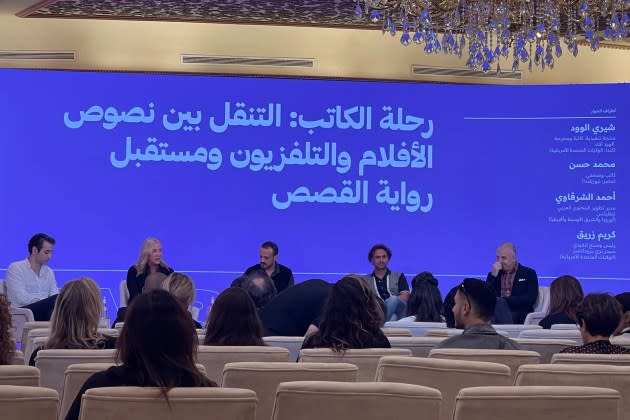End of Peak TV, AI, Stereotypes: Red Sea Fest Market Panel Takes on Hot Topics

The end of peak TV, the contrasting explosion of storytelling opportunities in the Middle East, AI and the portrayal were among the hot topics of debate as Red Sea 360°, the panel program of the market portion of the Red Sea International Film Festival in Jeddah, Saudi Arabia kicked off on Saturday.
Starting off the sessions of the third edition of the fest was a panel entitled “The Writer’s Journey: Navigating Scripts for Film, TV & Future Storytelling Formats.” Appearing on it were Ahmed Sharkawi, director of Arab content development at Netflix Europe, the Middle East and Africa (EMEA), Karim Zreik, executive producer and president of Cedar Tree Productions, Sheri Elwood, executive producer, writer and director at Elwood Ink, and writer and journalist Mohamed Hassan who is the creator and showrunner of the Sky original series Miles From Nowhere, a comedy about identity, surveillance and the Muslim community, which is premiering at the festival.
More from The Hollywood Reporter
'Obliterated' Creators Talk "Releasing Their Inner R-Rated Urges" With Netflix Action Comedy
Will Smith Talks "Mistakes," Saudi Arabia and 'I Am Legend 2' With Michael B. Jordan
“I know the market is just newly exploded here,” Elwood pointed out different trends in Saudi Arabia and the broader region and Hollywood. “But in North America, the market has really retracted, and buyers want something that is going to, I hate to use the word safe, because safe doesn’t necessarily mean it’s not interesting, but that’s going to appeal to the largest possible audience.”
Zreik also highlighted that “we are hitting the reset button on how much content we are making, how much we are spending.” He continued: “Budgets are slowing down, which may impact our relations.” But he encouraged local writers to be true to themselves and not hold back. “Be bold, be daring, that will just set you apart from everything else out there.”
Host Karim Safieddine, co-founder, CEO and executive producer at video-on-demand company Cinemoz, highlighted how the content spending slowdown in Hollywood compares with “what we’re experiencing here, which is a tidal wave of new projects.”
Sharkawi predicted more was to come from Saudi Arabia and beyond, saying that “there are so many stories in this region that haven’t been done before.” He added: “So it’s about harvesting those stories,” whether coming from such IP as books or original ideas. “This is a culture that loves stories.” He added that “people are watching everything” now in the broader region. “This kind of kind of openness to the world enhances the material that you are writing.”
At the same time, the world is increasingly opening up to content from around the globe. Sharkawi mentioned that a friend recently called him and shared news he loved to hear. “Her mother-in-law, who is 100 percent American, was recommending one of our Arab series [Finding Ola] to all her friends,” he said. “The U.S. audience is becoming open to watching stories that are outside of the U.S. experience.”
The panelists also discussed how this provides a chance for portrayals of local life and stories that feel less like caricatures.
Hassan said that actors were in the past often typecast to play stereotypical Middle Eastern characters in Hollywood productions, but now there is a chance to change that. “There is a real opportunity for this part of the world to seize control of the narrative of our region,” he argued. “As a journalist, something that really pains me is the fact that people only see the tragedy of our part of the world, they only see the suffering, and they are used to that, and that dehumanizes people. But I think the reason that all of us are here is because we have a desire to tell the stories in a way that showcases the joy of what it means to be of this part of the world, the character, the laughter, the irony, all of this kind of stuff that we understand in our bones. This is what storytelling is about. This is what film and TV is about. It’s about bringing these stories to life.”
On the topic of AI, the broad consensus was that it can’t provide the personal lenses and voices of human writers. “I’m a believer that AI can’t do what these talented writers can do,” Zreik said. That said, he added that, “I don’t know yet what the full capabilities of AI ai are going to mean for writing or analytics.”
Hassan shared a similar take. “I really believe that there’s something about writing that you can’t really nail down. You can’t really define what makes a good writer and a bad writer,” he said. “There are technicalities, but then after a while, there is a kind of emotion and tension in the way that you write that can move people, and you can pick up a book and be moved to tears or watch the dialogue on screen that was once a script and be moved by it and have that stay with you. I don’t think that will ever be replicated.”
And Netflix’s Sharkawi said: “AI may give you a funny logline or an interesting twist to a whole set of things up but I don’t think it can translate human emotions. I’m following a show because I like this character.” He added: “If I don’t connect with you, no matter what you do, even if you jump through hoops, I’m not interested. If I don’t take your temperature, I will not resonate with you, I will not open up.”
Best of The Hollywood Reporter
